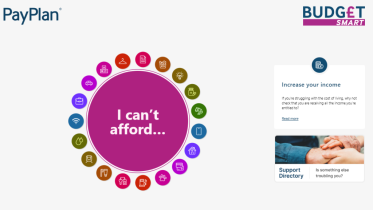We all know how difficult it is to talk about money, with many of us finding it hard to discuss increased cost of living expenses and the impact they have on our everyday lives.
Talk Money Week encourages the need to talk and be open with others about finances, having conversations about everything from pocket money to pensions and how to keep these conversations ongoing all year round.
There are many organised events and activities planned across the UK to get people talking about money, and this year’s focus is on ‘doing one thing’ to improve your financial wellbeing.
Why talk money?
With so many of us finding it harder to balance our budgets, it’s more important than ever that we get the right support for any money worries we may have.
Research shows that people who talk about money:
- make better and less risky financial decisions
- have stronger personal relationships
- feel less stressed or anxious and more in control.
Building money conversations into our everyday lives also helps us build financial confidence and resilience to face whatever the future throws at us.
Pick the right moment:
Rather than waiting until you feel upset about something, try to schedule in a meeting with your partner or family at a regular time each month to review the family finances and priorities. Don’t leave it until crisis point—arrange to talk about money regularly.
Set an agenda:
- Ask everyone involved to say what they would like to be included in the agenda. Include financial goals. You can discuss spending plans and goals and work out whether you need to cut back on anything in order to achieve this. By focussing on shared goals, the meeting is less likely to become confrontational.
- To start with, you might want to talk about how much you need to spend on monthly budgeting and how to share bills or cut household costs. It’s important to discuss goals such as a future holiday, or how to save up for a car that is going to need replacing in the future.
Don’t judge:
It’s important not to impose your ideas too forcefully on other people. Try to listen and be understanding. People are much more likely to be honest about debt or other financial struggles they are having if they know they are not going to be made to feel judged.
Plan ahead:
By having a regular meeting, you can start to think about the medium and long term, rather than just sorting out bills and payments for the next couple of months.
Do one thing:
This year’s Talk Money awareness campaign is aimed at encouraging people to “do one thing” that could help improve their financial wellbeing – and to make a noise about it, to inspire others to do the same.
It doesn’t have to be huge. In fact, it could be as simple as:
- Taking a look at your budget to really understand your spending habits
- Cancelling any unused subscriptions and memberships
- Signing up for rewards cards – your points will soon add up and help save on future shops
- Shopping around use comparison websites when renewing utilities, insurances etc
- Selling unwanted items on websites such as Vinted, Music Magpie, eBay etc.
Finding help to manage your finances and debts
If you are struggling to manage living expenses or are worried about debt issues, here are some organisations that can help you
- Free school meals
- Financial help for households
- Food banks
- Furniture / white goods
- Help with water costs
- Help with energy costs
- Low-income advice
- Blue Light Card
- Reward For Rescue
- Debt: PayPlan
- Debt: Stop Loan Sharks
How can we help at Fire Fighters Charity?
Our Welfare Services team can offer help with any of the following:
- Advice and signposting information
- Onward referral to debt management
- Maximising benefit income.
- Financial hardship support
- Support with equipment and adaptations
- Housing advice and support
- Help with unforeseen expenses
- Social care support
- Travel costs
- Internal referral to other Charity services.
To find out more, call our Support Line on 0800 389 8820 or email: [email protected].




